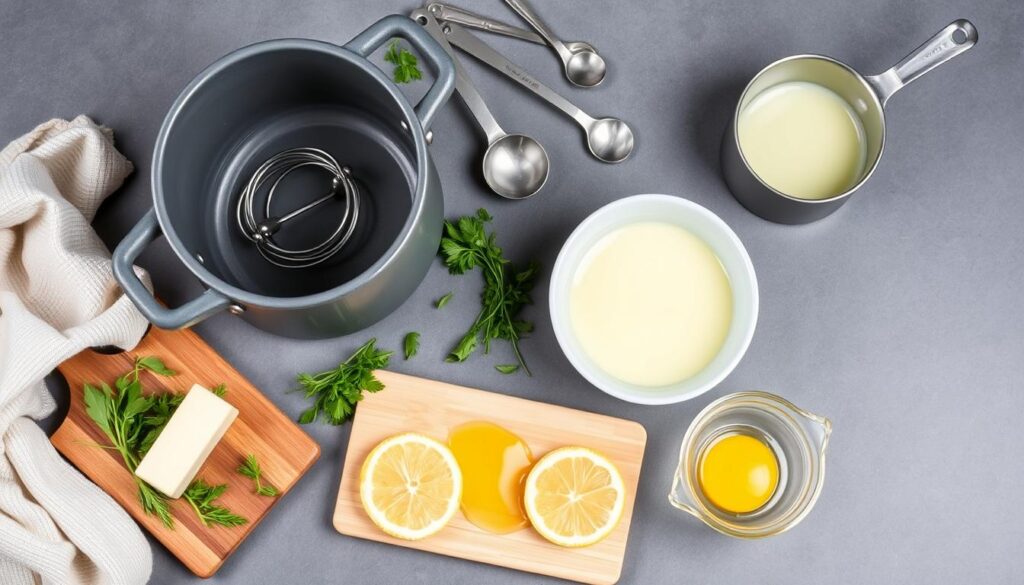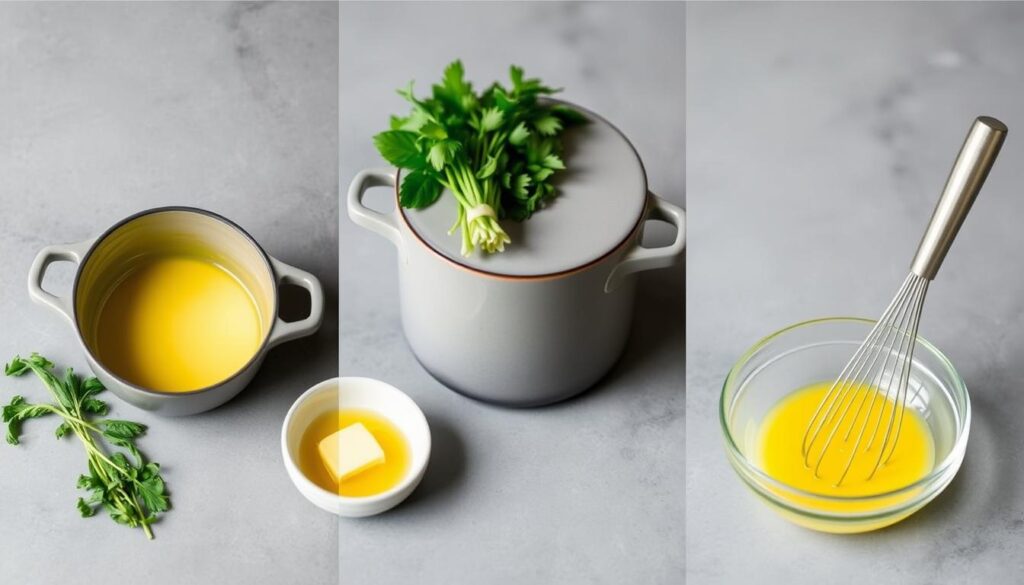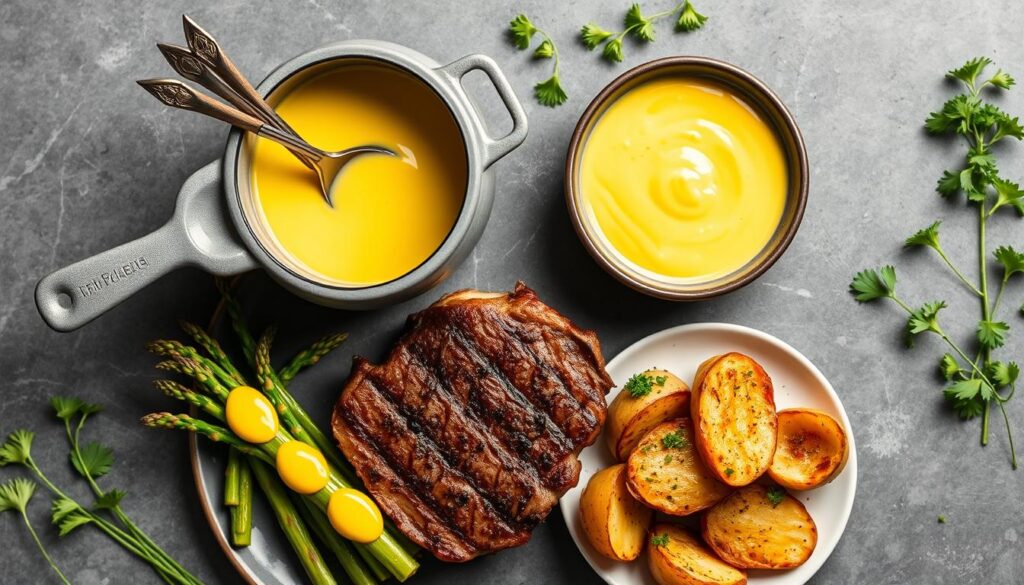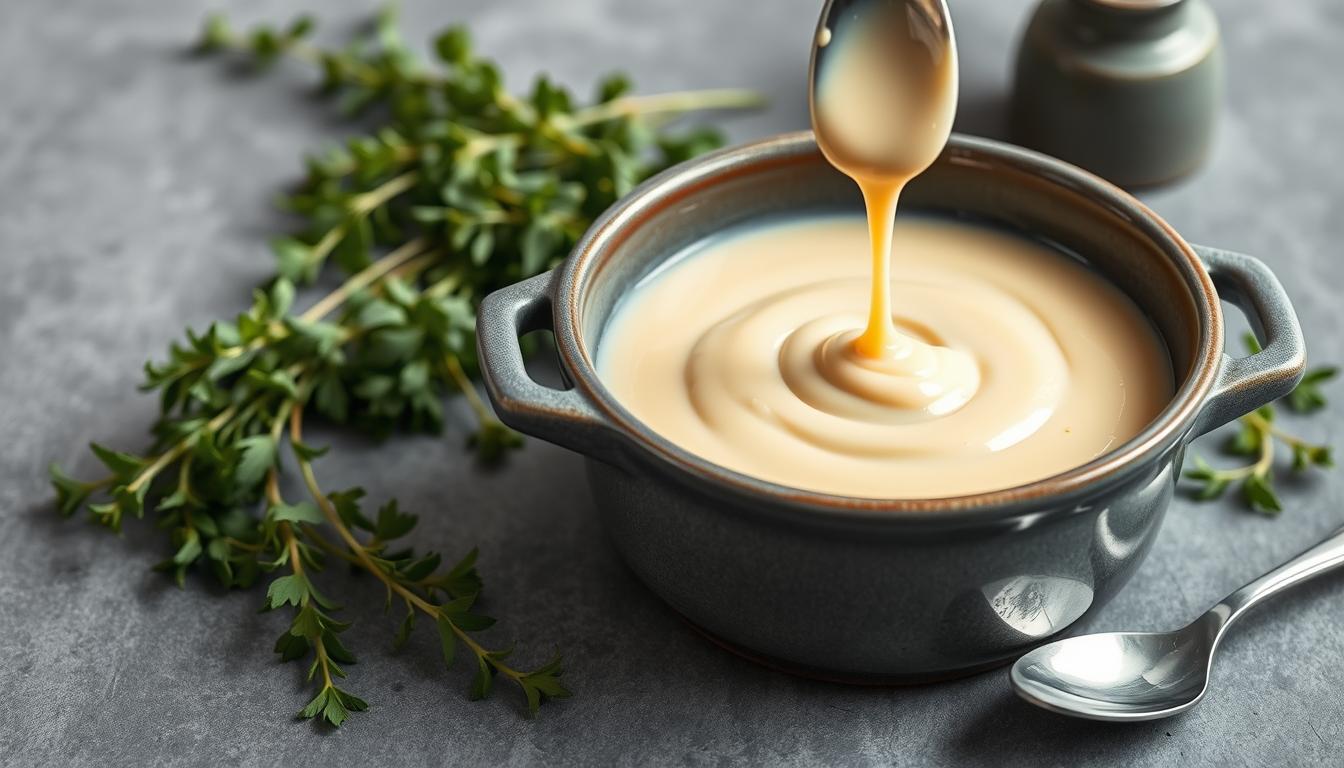Every great chef has a special sauce. For me, that sauce is bearnaise. It makes simple dishes taste amazing.
Bearnaise sauce is more than just a sauce. It shows the power of good technique and ingredients. It’s perfect for anyone who loves to cook or wants to impress.
The magic of bearnaise is in its simplicity. With a few ingredients and some skill, you can make a sauce that makes any meal special.
Key Takeaways
- Bearnaise sauce is a classic French butter-based sauce
- Perfect for making meats, vegetables, and seafood taste better
- Needs careful temperature control and whisking
- Can be made in about 5 minutes
- Serves about 8 people
- Uses basic ingredients like egg yolks, butter, and fresh herbs
What is Bearnaise Sauce?
Bearnaise sauce is a classic French dish that makes simple meals taste like gourmet food. It was first made in August 1837 for a big train line opening. It quickly became a key part of French cooking.
This sauce is rich and creamy, with a unique taste. It’s different from other classic sauces. Let’s dive into the world of this tasty French sauce.
Origin and History
The sauce is a twist on Hollandaise, another French classic. Chefs added herbs and a special cooking method. This turned simple ingredients into a work of art.
The art of bearnaise sauce lies in its delicate balance of flavors and precise preparation.
Key Ingredients
The ingredients for bearnaise sauce are chosen for their flavor. The main parts are:
- White wine vinegar
- Shallots
- Fresh tarragon
- Black pepper
- Egg yolks
- Melted butter
Flavor Profile
Bearnaise sauce has a rich, buttery taste with a hint of herbs. The vinegar adds a bit of tanginess. Fresh tarragon brings a sweet, aromatic flavor.
| Ingredient | Quantity | Purpose |
|---|---|---|
| White Wine Vinegar | ½ cup | Creates acidic base |
| Shallots | ½ cup | Adds depth of flavor |
| Fresh Tarragon | 1 cup | Provides herbal notes |
Bearnaise sauce can turn simple dishes into amazing meals. It’s loved by chefs and home cooks everywhere.
Perfect for game days or casual snacking, this guacamole recipe combines avocado, lime, and cilantro for a flavorful dip. Find the full recipe in our Classic Guacamole Recipe: Avocado, Lime & Cilantro
Essential Tools for Making Bearnaise Sauce
Making the best bearnaise sauce needs more than just cooking skills. The right tools are key to a great sauce. Knowing how to make bearnaise starts with choosing the right equipment for smooth prep and perfect texture.

For a delicious bearnaise sauce, you need precision and the right kitchen tools. Let’s look at the essential equipment for a restaurant-quality sauce at home.
The Critical Double Boiler
A double boiler is vital for a smooth, velvety bearnaise sauce. It heats gently, preventing egg yolks from scrambling. If you don’t have a double boiler, a heat-safe bowl over simmering water works too.
Choosing the Right Whisk
Your whisk is the key to making the best bearnaise sauce. A sturdy balloon whisk helps:
- Incorporate air into the egg yolks
- Create a smooth, emulsified texture
- Prevent lumps in your sauce
- Blend ingredients thoroughly
Precise Measuring Cups
Accuracy is important when making bearnaise sauce. Get a set of measuring cups with:
- Liquid measuring cups with clear markings
- Dry measuring cups for precise portions
- Nested measuring cups for easy storage
“The right tools transform cooking from a task to an art.” – Culinary Expert
With these essential tools, your kitchen is ready to make a stunning bearnaise sauce. It will be as good as those in fine dining restaurants.
Step-by-Step Guide to Preparing Bearnaise Sauce
Making classic bearnaise sauce might seem hard, but it’s easy with the right steps. This recipe makes it simple. You’ll learn how to make a perfect sauce every time.

Preparing the Reduction
The first step is a flavorful reduction. You need to mix some key ingredients:
- 1/2 cup dry white wine
- 1/4 cup white wine vinegar
- Finely chopped shallots
- Fresh tarragon leaves
- Black peppercorns
Simmer these in a saucepan until it’s almost gone. You’ll have about 2 tablespoons left. This makes the sauce very flavorful.
Whisking the Egg Yolks
Next, whisk egg yolks carefully. Use 2 large egg yolks and mix them with the reduction over low heat. Temperature control is key to avoid scrambled eggs.
Emulsifying the Sauce
The last step is precise. Slowly add 3/4 cup of melted butter while whisking. This makes the sauce creamy and smooth.
| Ingredient | Quantity | Purpose |
|---|---|---|
| Egg Yolks | 2 large | Binding agent |
| Butter | 3/4 cup | Creamy texture |
| White Wine Vinegar | 1/4 cup | Flavor base |
“Patience and technique are the secret ingredients to a perfect bearnaise sauce.” – Classic French Culinary Wisdom
Remember, serve your sauce right away or keep it warm for up to an hour. With practice, you’ll make amazing bearnaise sauce at home!
Tips for Achieving the Right Consistency
Making the best bearnaise sauce recipe needs precision and knowing about sauce dynamics. The secret to a perfect homemade bearnaise is mastering its delicate consistency.
Understanding Sauce Density
Achieving the ideal bearnaise sauce consistency is an art. Your sauce should be smooth and velvety. It should coat the back of a spoon without being too thick or runny.
A perfectly prepared homemade bearnaise will have a luxurious, medium-thick consistency. It should flow gracefully.
Adjusting Ingredients for Perfect Texture
When working on your best bearnaise sauce recipe, you’ll need to make subtle adjustments to achieve the right density:
- If the sauce is too thick, add a splash of hot water to thin it out
- For a thin sauce, continue whisking over low heat to reduce and thicken
- Use gradual butter incorporation to maintain smooth emulsification
Common Mistakes to Avoid
“The difference between a good and great bearnaise sauce is in the details.” – Professional Chef
Watch out for these common mistakes when preparing your homemade bearnaise:
- Adding butter too quickly, which can cause sauce separation
- Overheating the mixture, leading to scrambled eggs
- Not whisking continuously during preparation
- Using cold ingredients that interrupt proper emulsification
Pro tip: A mixture of 3 egg yolks combined with 1 cup of melted butter is key to achieving the right consistency for your bearnaise sauce.
Pairing Bearnaise Sauce with Dishes
Exploring what bearnaise sauce pairs well with can make your cooking better. This sauce is not just for steak. It’s great with many dishes, whether you cook at home or in a restaurant.

Bearnaise sauce is tangy and creamy. It’s different from peppercorn sauce. Here are some tasty dishes it goes well with:
Classic Meat Pairings
- Grilled steak (medium-rare at 135°F)
- Roasted buffalo tenderloin
- Grilled lamb chops
Seafood and Fish Options
- Poached cod
- Salmon
- Grilled fish varieties
Vegetable Companions
- Steamed broccoli
- Roasted asparagus
- Grilled vegetable medleys
| Dish Category | Recommended Preparation | Bearnaise Compatibility |
|---|---|---|
| Grilled Meats | Medium-rare, 2-3 minutes per side | Excellent |
| Seafood | Poached or gently grilled | Very Good |
| Vegetables | Steamed or roasted | Good |
Pro tip: Try bearnaise sauce with new dishes. You might find your favorite flavors!
“Bearnaise sauce turns simple meals into amazing dishes.” – Professional Chef
Variations of Bearnaise Sauce
Exploring bearnaise sauce variations can change your cooking game. The classic sauce is a great base for new flavors. It can make your dishes stand out.
Chefs and home cooks enjoy trying new bearnaise sauce recipes. Each one adds a special touch to the French classic.
Classic Bearnaise Sauce Foundation
The traditional bearnaise sauce recipe is simple. It includes:
- Egg yolks (3 recommended)
- White wine vinegar reduction
- Unsalted butter (8 tablespoons)
- Fresh herbs like tarragon
Mustard Bearnaise Twist
Mustard bearnaise adds a tangy twist. Dijon mustard makes the sauce bolder. It’s great with grilled meats.
Herb-Infused Bearnaise Innovations
Herb-infused sauces can really change the flavor. Here are some cool options:
| Variation | Herb Substitution | Flavor Profile |
|---|---|---|
| Sauce Paloise | Mint instead of tarragon | Bright, fresh taste |
| Sauce Choron | Added tomato purée | Rich, slightly sweet |
| Sauce Colbert | Reduced white wine | Complex, wine-enhanced |
When trying new bearnaise sauce recipes, remember. It takes about 20 minutes to make. You get about 8 oz. The trick is mixing old ways with new ingredients.
“Cooking is an art, and bearnaise sauce is your canvas for culinary creativity.” – Anonymous Chef
Storage Tips for Bearnaise Sauce
Keeping your homemade bearnaise sauce fresh is key. Learning how to store and reheat it right lets you enjoy its taste for days.
Refrigeration Essentials for Homemade Bearnaise
Your bearnaise recipe needs good storage to stay fresh. Here’s how to keep it in the fridge:
- Store in an airtight container
- Refrigerate right after making it
- Keep it at 34°F to 40°F
- Use it within 1-2 days for best taste
Spotting Sauce Spoilage
Look out for these signs that your sauce has spoiled:
| Spoilage Indicator | Action |
|---|---|
| Unusual color change | Discard immediately |
| Sour or off odor | Do not consume |
| Texture separation | Sauce is no longer safe |
| Mold growth | Throw away without hesitation |
Reheating Your Bearnaise Sauce
To warm up your sauce, use a gentle method:
- Use a double boiler for even heating
- Whisk constantly to prevent separation
- Heat slowly and carefully
- Stop heating once sauce reaches desired consistency
Pro tip: Never microwave your bearnaise sauce, as this can cause irreversible separation.
By sticking to these tips, your homemade bearnaise will stay fresh longer. You’ll get a top-notch sauce every time.
With its Mediterranean flavors and healthy ingredients, this recipe is a must-try for family dinners. Discover more in our guide to Tasty Greek Chicken Dinner Ideas
Common Questions about Bearnaise Sauce
Bearnaise sauce can be tricky to master. But knowing its secrets helps home cooks make it with confidence. Let’s look at common questions about making bearnaise and its special ingredients.
Freezing Bearnaise: A Delicate Dilemma
Experts say not to freeze bearnaise sauce. The mix of egg yolks and clarified butter doesn’t stay together well when frozen. Instead, make it fresh or keep it in the fridge for up to 2 days.
Troubleshooting a Split Sauce
Don’t worry if your bearnaise sauce splits! Here are quick ways to fix it:
- Whisk in a tablespoon of hot water
- Start over with a new egg yolk
- Slowly add the split sauce to the new base
Understanding Bearnaise Ingredients
Knowing what’s in bearnaise sauce is key. The classic mix includes:
| Ingredient | Role in Sauce |
|---|---|
| Egg Yolks | Creates emulsion and richness |
| Clarified Butter | Gives smooth, rich texture |
| White Wine Vinegar | Adds tangy flavor |
| Shallots | Brings subtle, sharp taste |
| Tarragon | Introduces signature herbal notes |
“Mastering bearnaise sauce is about understanding its delicate balance of ingredients and technique.” – Walter Trupp
With practice and patience, you’ll make this sauce into a luxury that makes any dish better.
Conclusion: Elevating Your Culinary Skills with Bearnaise Sauce
Learning to make classic bearnaise sauce is a big step for any home cook. It can make simple meals into special dining moments. Making a perfect bearnaise sauce is more than just cooking. It’s about knowing how to mix ingredients and use the right techniques.
Getting the emulsification right is key to a great bearnaise sauce. Egg yolks are important for mixing everything together. With practice, you’ll get better at making a smooth, rich sauce. This shows you know a lot about cooking and will impress others.
Final Thoughts
Every time you make bearnaise sauce, you’ll feel more confident in your cooking. This sauce is very flexible. You can try new herbs, change the thickness, and use it with many dishes. Your homemade sauce will make any meal taste like it’s from a fancy restaurant.
Experimenting with Flavors
Don’t be shy to make your own version of bearnaise sauce. Add unique herbs, change the tanginess, or play with the ingredient amounts. Cooking is like art, and your bearnaise sauce can be your creative canvas. With time and effort, you’ll become a true sauce master.

